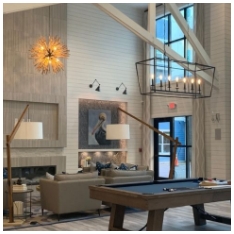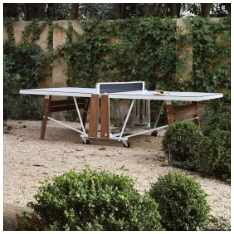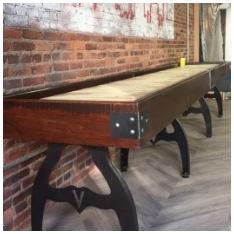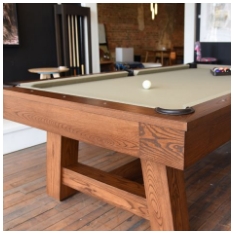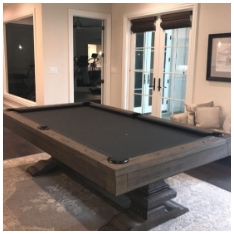Buying a pool table is an exciting investment, but it can also be overwhelming if you’re not sure where to start. With so many sizes, styles, and materials available, how do you make the right choice? Whether you’re setting up a game room or simply want a table for some casual fun, this guide will walk you through the top five essential tips to help you choose the perfect pool table for your space and needs. Let’s dive into the details.

Tip 1: Determine the Available Space for Your Pool Table
Before you start browsing pool tables, the first thing you need to consider is the amount of space you have. Pool tables require much more room than the table itself. You need to account for both the size of the table and the space required for players to move around and comfortably shoot.
Measuring Your Room
Grab a tape measure and measure your game room or designated area. Keep in mind that you’ll need extra clearance on all sides for the pool cues, so measure your room’s length and width and compare it to the dimensions of potential pool tables. A good rule of thumb is to leave at least 5 feet of space around the table for players to move.
Consider Space for Pool Cues
It’s not just about fitting the table itself. Pool cues can vary in length, but the most common cue is around 57 inches long. Make sure you have enough space to comfortably use a cue from any angle without hitting the walls or other objects.
Tip 2: Choosing the Right Size of Pool Table
Pool tables come in a variety of sizes, and choosing the right one is critical to ensuring a great playing experience. The size of the table will directly affect your game, so take time to decide which is best for you.
Standard Sizes for Pool Tables
The most common pool table sizes are 7-foot, 8-foot, and 9-foot tables. Each has its pros and cons. A 7-foot table is great for casual players or smaller spaces, while an 8-foot table offers a more balanced experience for both casual and serious players. A 9-foot table is considered regulation size and is typically used for professional or tournament play.
Full-Size vs. Smaller Tables
If you have the space and are serious about your game, go for a full-size table. However, smaller tables can be a practical option if your room is limited in size. Don’t compromise on gameplay—choose a table that fits comfortably in your space without feeling cramped.
Tip 3: Understand Pool Table Materials
The material of your pool table will impact its durability, performance, and cost. Here’s what to look for when comparing different table materials.
The Importance of Slate vs. MDF
A high-quality pool table will usually have a slate playing surface. Slate is a durable and flat rock that ensures smooth, consistent gameplay. If you’re looking for a long-lasting table, opt for slate. MDF (Medium-Density Fiberboard) is an alternative for budget-friendly tables, but it won’t provide the same level of quality and longevity as slate.
Wood vs. Metal Frames
Pool tables can also have different frame materials, with wood and metal being the most common. Wooden frames offer a traditional and classy look, while metal frames are more modern and industrial. Both materials can be durable, but wood tends to add a sense of elegance to a room.
Tip 4: Consider the Pool Table’s Design and Style
Your pool table should not only function well but also complement your game room’s overall design.
Matching Your Game Room’s Aesthetic
Pool tables come in a variety of designs, from sleek and modern to ornate and classic. Think about the decor of your game room or space where the table will be placed. Whether you prefer a modern design with clean lines or a more traditional style, choose a pool table that reflects your personal taste and matches your space.
Modern vs. Classic Pool Table Styles
Some tables feature minimalist designs, while others include intricate wood carvings and leather pockets. The choice depends on your style preference, but keep in mind that a more elaborate design may require additional maintenance to keep it looking pristine.
Tip 5: Set Your Budget for a Pool Table
Cost is one of the biggest factors when purchasing a pool table, so you need to determine your budget before making a decision.
Price Range for Different Pool Tables
The cost of pool tables varies significantly based on size, material, and brand. Entry-level pool tables with MDF surfaces can cost as little as a few hundred dollars, while high-end slate tables can go up to several thousand dollars. Establish a budget that works for you and stick to it while browsing your options.
Factoring in Installation Costs
Don’t forget about installation costs! High-quality pool tables, especially those with slate surfaces, require professional installation to ensure they’re level and properly set up. Be sure to factor this into your overall budget.
Other Features to Look for in a Pool Table
When choosing a pool table, there are additional features that can enhance your playing experience.
Cushions and Cloth Quality
The quality of the table’s cushions and cloth will affect how the balls move across the surface. Look for tables with durable, high-quality felt and cushions that provide a good bounce. These small details can make a big difference in the longevity and playability of the table.
Caring for Your Pool Table
Once you’ve purchased your pool table, it’s important to take care of it to ensure it lasts for years.
Regular Maintenance Tips
Proper care of your pool table includes regularly brushing the cloth to remove dust and chalk, covering the table when not in use, and ensuring that the frame and slate are kept in good condition. Following these simple maintenance steps will help your table stay in top shape.
Cleaning the Cloth and Slate
To keep your table looking and playing its best, periodically clean the felt and slate. Avoid using harsh chemicals; instead, use a gentle brush and a specialized cleaner designed for pool tables.
Conclusion
Buying a pool table is an investment in fun, entertainment, and skill. By following these top five tips—considering your space, choosing the right size, understanding materials, matching your style, and setting a budget—you’ll be well on your way to selecting the perfect table. Once you’ve found the right table, you’ll be able to enjoy countless games with family and friends for years to come.

